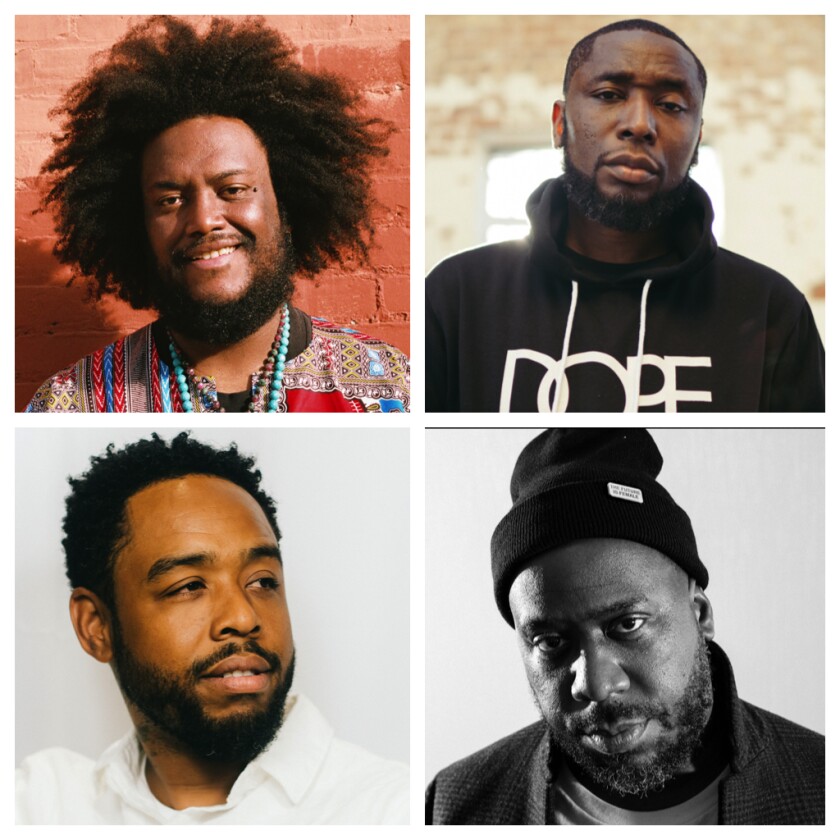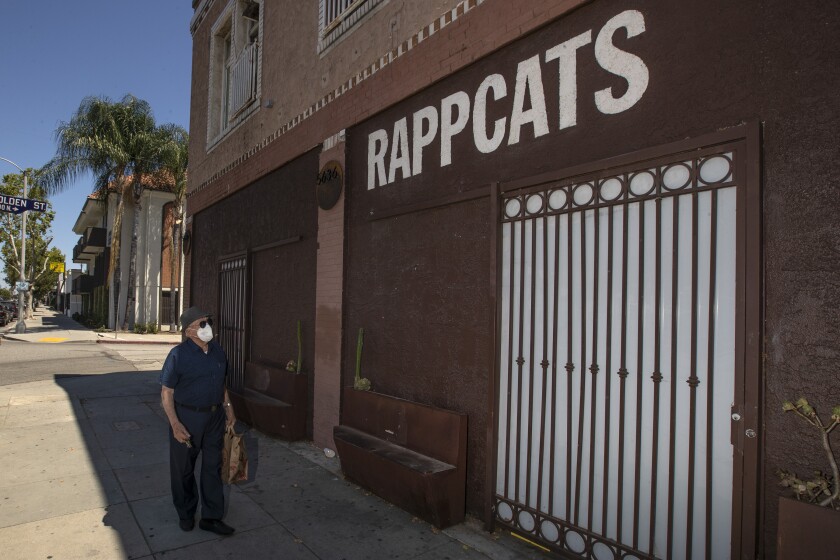Of all the cries of Black fury released during the protests around the police killing of George Floyd in Minneapolis, none arrived as quietly as Dinner Party’s single “Freeze Tag.”
The song, released in late June, is from a new supergroup of bicoastal jazz and hip-hop luminaries: L.A.’s Kamasi Washington and Terrace Martin, Houston’s Robert Glasper and North Carolina producer 9th Wonder (Patrick Douthit). It barely rises above a whispered falsetto and the daydreaming-on-a-fire-escape vibes of ’70s soul. If you wanted, you could definitely put it on as you open a second bottle of wine while chopping vegetables tonight.
But the scene it sets in the lyrics is just seconds away from a murder by cop.
“They told me put my hands up behind my head / I think they got the wrong one,” sings guest vocalist Phoelix. “I’m sick and tired of runnin’ … Then they told me if I move, they gon’ shoot me dead.”
The quartet wrote the tune well before these protests heaved in city streets for ongoing weeks. But sadly, there’s never a month when it wouldn’t have been salient in America.
“Everything happening has been going on since before we were born,” Washington said. “The feeling that the society you’re a part of, the people you think are your neighbors, feel that our lives are so disposable — it’s hard to really explain it. Breonna Taylor was in her own home, a first responder who risked her life every day at her job, and someone comes and kills her, and society says it’s not a crime?”
In a year rent with despair over the COVID-19 pandemic and a long-overdue reckoning with America failing its Black citizens, Dinner Party’s self-titled debut arrived July 10 with all the skill and care that four master musicians could marshal to make an album as a balm.
But in the spirit of their mutual hero Marvin Gaye — whose “What’s Going On” lamented brutality over immaculate arrangements — it’s also a quieter way of telling that cop in “Freeze Tag” to put his gun down.
“An artist’s job is to reflect the times, but I feel for Black artists, there’s a deeper responsibility,” Martin said. “This is a conversation we’re been born into, and we’re born into f— up times.”
The four members of Dinner Party — all in their late 30s to mid-40s — go back decades as friends and collaborators. Martin and Washington met as high schoolers playing saxophone in elite L.A. arts schools; Glasper came into their orbit at a youth band camp. Each have titanic solo albums and productions to their catalogs: Washington’s triple- and quadruple-albums for Flying Lotus’ Brainfeeder label; Glasper’s three-time Grammy-winning “Black Radio” albums and Emmy-winning composition for Ava DuVernay’s “13th”; Martin’s productions for Stevie Wonder and YG and his Sounds of Crenshaw label; 9th Wonder’s tracks for Jay-Z, Destiny’s Child, Erykah Badu, Rapsody and Anderson .Paak.
But their collective work with Kendrick Lamar helped cohere a new model for jazz and hip-hop in the 2010s. Martin, Glasper and Washington are all over Lamar’s 2015 opus “To Pimp a Butterfly,” and 9th Wonder produced the three beats that form “Duckworth,” the zenith of Lamar’s 2017 Pulitzer-winning LP “Damn.”
Their shifting roles within those projects — globally renowned writers and performers but also eager to help build another artist’s vision — set the template for Dinner Party after the sweep of “Damn” through the American ivory tower.
“That’s the beauty of this group, every member was humble enough to play their part,” Douthit said. “We wanted it to feel free and slow, not like ‘put big ‘ol solo here,’ ” Washington added. “Not to make it soft, but to let vibe be the star of the show.”
After a career at the top of Lamar’s fold of producers and writers, his reimagining of jazz and hip-hop’s blend in the American canon is indisputable. But the success also left him wary about who, exactly, is listening anyway.
“The world always loves what we give, but a lot of [listeners] don’t embrace us wholeheartedly,” Martin said. “I’ve grown to know that, and I’m very careful with who I talk to in music. I’m talking to people who understand self-doubt, suicide, prison, single mothers and fathers. People dealing with real life.”
In forming Dinner Party, he was almost subversive in that respect. The band made a smooth-sipping jazz-soul LP which, if coffee shops ever reopen, would be on a constant loop at Hot & Cool in Leimert Park. The band name is definitely a little tongue-in-cheek but also completely accurate.
Fans used to the dozens-strong bands on Washington’s LPs, or the fast-spinning pivots of Lamar’s albums, might be shocked at just how peaceful this seven-song album sounds. There are few moments anyone would call a solo, and it’s just as sample-driven as it is a showcase for the group’s arranging prowess. “Sleepless Nights” and “First Responders” nod along with warmhearted balladry and fizzy psychedelia; “Luv U” ends the album on a vocodered jazz-fusion jam halfway between Steve Arrington’s funk and late-’90s hip-hop.
But just beneath that reassuring glow, there are hard looks at what Black brilliance is worth in a society that won’t let Black people live.
“It’s a protest album but also not, you can listen to it and not feel like you’re watching the news,” Glasper said. “When people write songs about police brutality, often it’s more of a hardcore rap where you can feel the anger. We came from a Marvin Gaye standpoint where the music and vibe is calm, but the message is ‘What are you doing? Come on.’ You can do it in a way to let people know ‘I’m just trying to live life and make it to next summer.’ ”
In different ways, all four of them needed this clandestine jam with old friends, walking out of the studio with a short, modest album that wears its collective talent lightly. The constant news scroll of Black grief, combined with a pandemic that shut down the music industry, left them needing a respite.
“We’re chipping away at a mountain,” Washington said.
But the last few months have also made them angry. Martin also released one of the most acidic protest singles of the George Floyd era, “Pig Feet,” with Washington, Denzel Curry, G Perico and Daylyt. It’s everything Dinner Party isn’t — the song is packed with furious lyrics and skronking noise, released like a firework shot back at a phalanx of police.
“Something flipped a switch,” Martin said. “When we dropped that song, a lot of our peers were silent, and people didn’t know what to do, so I said ‘I’m gonna fire off this shot and hope people follow.’ ”
But he’s also pretty jaundiced about what music can even do right now.
“I only give a f— about staying alive. I worry about my Black sons and father staying alive,” he said. “We’re people before we’re musicians. I look at artist interviews that make people think that being an artist is like a being a superhero. But guess what, coronavirus don’t give a f—, and if you’re Black, police don’t give a f—.”
At a moment when the movement for Black lives tries to translate popular momentum into real policy changes, however, much of the small scene that forged these musicians’ careers is on life support. Nonprofit clubs like the World Stage in Leimert Park and Smalls in New York City allowed these young artists to find a sound that would eventually win them Grammys and Coachella gigs.
“I moved to New York for those clubs where you learn to be musician, where you stay out until 7 a.m. and sit next to Roy Hargrove and talk to him and then go straight into college classes. I hope somebody comes around to keep them alive and not turn them into condos,” Glasper said. “We should be able to get through quarantine without losing parts of society that we love,” Washington added. “We shouldn’t be in a position to choose between our lives or our lives.”
That’s a dilemma Black artists have been asking their whole lives — what to do with a society that loves your music but doesn’t seem to love you in return. Dinner Party’s four members may differ on some means to fight back. But the album they made together was an intentional choice to wear their brilliance gently. All the sadness and anger and confusion will still be there, just beneath it.
“Black genius is very important in this time,” Douthit said. “Now more than ever, millions and millions of Americans are listening to what we’re saying and applying it. It’s the best time for people to pay attention to Black struggle, Black culture, Black everything.”








More Stories
In tune with Jefferson Berry: A unique blend of acoustic urban storytelling: Videos, Photos
If he were a guitarist he’d be as well-known as Eric Clapton, but Terry Hanck is a sax player! Videos, Photo
Eric Gales՛s new album 2025, releases single with Buddy Guy & Roosevelt Collier: Video, CD cover